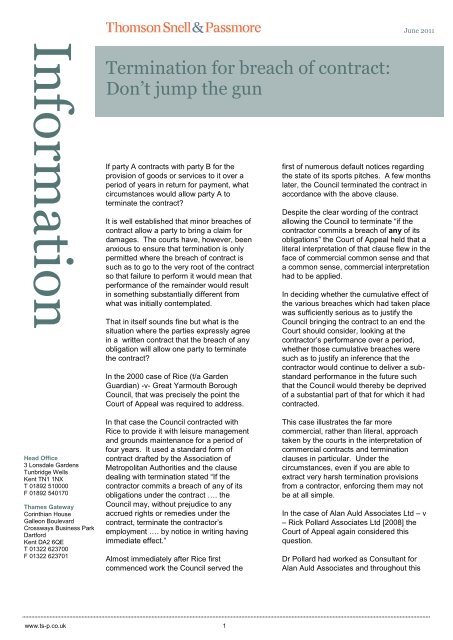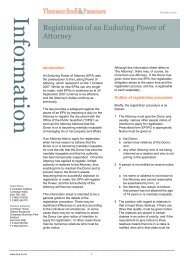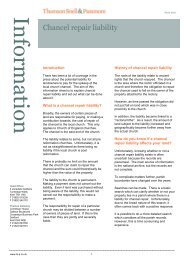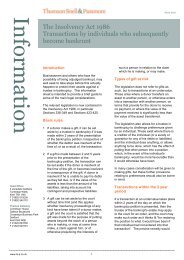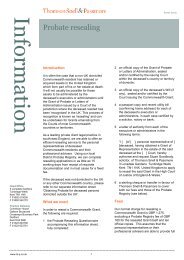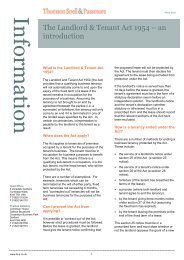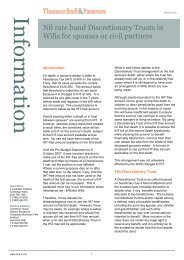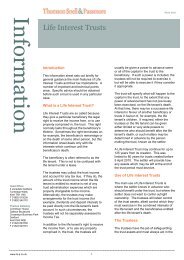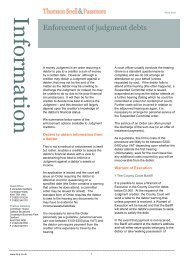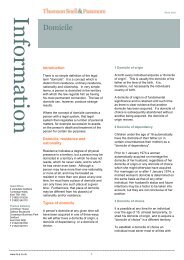Termination for breach of contract - Thomson Snell and Passmore
Termination for breach of contract - Thomson Snell and Passmore
Termination for breach of contract - Thomson Snell and Passmore
Create successful ePaper yourself
Turn your PDF publications into a flip-book with our unique Google optimized e-Paper software.
In<strong>for</strong>mationJune 2011<strong>Termination</strong> <strong>for</strong> <strong>breach</strong> <strong>of</strong> <strong>contract</strong>:Don’t jump the gunHead Office3 Lonsdale GardensTunbridge WellsKent TN1 1NXT 01892 510000F 01892 540170Thames GatewayCorinthian HouseGalleon BoulevardCrossways Business ParkDart<strong>for</strong>dKent DA2 6QET 01322 623700F 01322 623701If party A <strong>contract</strong>s with party B <strong>for</strong> theprovision <strong>of</strong> goods or services to it over aperiod <strong>of</strong> years in return <strong>for</strong> payment, whatcircumstances would allow party A toterminate the <strong>contract</strong>?It is well established that minor <strong>breach</strong>es <strong>of</strong><strong>contract</strong> allow a party to bring a claim <strong>for</strong>damages. The courts have, however, beenanxious to ensure that termination is onlypermitted where the <strong>breach</strong> <strong>of</strong> <strong>contract</strong> issuch as to go to the very root <strong>of</strong> the <strong>contract</strong>so that failure to per<strong>for</strong>m it would mean thatper<strong>for</strong>mance <strong>of</strong> the remainder would resultin something substantially different fromwhat was initially contemplated.That in itself sounds fine but what is thesituation where the parties expressly agreein a written <strong>contract</strong> that the <strong>breach</strong> <strong>of</strong> anyobligation will allow one party to terminatethe <strong>contract</strong>?In the 2000 case <strong>of</strong> Rice (t/a GardenGuardian) -v- Great Yarmouth BoroughCouncil, that was precisely the point theCourt <strong>of</strong> Appeal was required to address.In that case the Council <strong>contract</strong>ed withRice to provide it with leisure management<strong>and</strong> grounds maintenance <strong>for</strong> a period <strong>of</strong>four years. It used a st<strong>and</strong>ard <strong>for</strong>m <strong>of</strong><strong>contract</strong> drafted by the Association <strong>of</strong>Metropolitan Authorities <strong>and</strong> the clausedealing with termination stated “If the<strong>contract</strong>or commits a <strong>breach</strong> <strong>of</strong> any <strong>of</strong> itsobligations under the <strong>contract</strong> …. theCouncil may, without prejudice to anyaccrued rights or remedies under the<strong>contract</strong>, terminate the <strong>contract</strong>or’semployment …. by notice in writing havingimmediate effect.”Almost immediately after Rice firstcommenced work the Council served thefirst <strong>of</strong> numerous default notices regardingthe state <strong>of</strong> its sports pitches. A few monthslater, the Council terminated the <strong>contract</strong> inaccordance with the above clause.Despite the clear wording <strong>of</strong> the <strong>contract</strong>allowing the Council to terminate “if the<strong>contract</strong>or commits a <strong>breach</strong> <strong>of</strong> any <strong>of</strong> itsobligations” the Court <strong>of</strong> Appeal held that aliteral interpretation <strong>of</strong> that clause flew in theface <strong>of</strong> commercial common sense <strong>and</strong> thata common sense, commercial interpretationhad to be applied.In deciding whether the cumulative effect <strong>of</strong>the various <strong>breach</strong>es which had taken placewas sufficiently serious as to justify theCouncil bringing the <strong>contract</strong> to an end theCourt should consider, looking at the<strong>contract</strong>or’s per<strong>for</strong>mance over a period,whether those cumulative <strong>breach</strong>es weresuch as to justify an inference that the<strong>contract</strong>or would continue to deliver a subst<strong>and</strong>ardper<strong>for</strong>mance in the future suchthat the Council would thereby be deprived<strong>of</strong> a substantial part <strong>of</strong> that <strong>for</strong> which it had<strong>contract</strong>ed.This case illustrates the far morecommercial, rather than literal, approachtaken by the courts in the interpretation <strong>of</strong>commercial <strong>contract</strong>s <strong>and</strong> terminationclauses in particular. Under thecircumstances, even if you are able toextract very harsh termination provisionsfrom a <strong>contract</strong>or, en<strong>for</strong>cing them may notbe at all simple.In the case <strong>of</strong> Alan Auld Associates Ltd – v– Rick Pollard Associates Ltd [2008] theCourt <strong>of</strong> Appeal again considered thisquestion.Dr Pollard had worked as Consultant <strong>for</strong>Alan Auld Associates <strong>and</strong> throughout thiswww.ts-p.co.uk 1
June 2011<strong>Termination</strong> <strong>for</strong> <strong>breach</strong> <strong>of</strong> <strong>contract</strong>:Don’t jump the gun (continued)time, having issued 19 invoices between 31December 2004 <strong>and</strong> 30 April 2006, not one<strong>of</strong> his invoices had been paid on, or indeedanywhere near on time, leading to the totalamount outst<strong>and</strong>ing growing to £721,000.Dr Pollard withdrew his services <strong>and</strong>continued to work on the project throughanother consultant. Alan Auld Associatessought to bring a claim <strong>for</strong> their lost pr<strong>of</strong>italleging that Dr Pollard had withdrawn hisservices in <strong>breach</strong> <strong>of</strong> the (implied) terms <strong>of</strong>the <strong>contract</strong>. Dr Pollard said that he hadaccepted Alan Auld Associates’ repudiatory<strong>breach</strong> <strong>of</strong> <strong>contract</strong> arising from persistentlate payment “with every prospect <strong>of</strong>continuing to do so in the future”.The Court <strong>of</strong> Appeal re-visited their decisionin the Rice case, confirming that thecumulative effect <strong>of</strong> <strong>breach</strong>es <strong>and</strong> likelihood<strong>of</strong> future <strong>breach</strong>es may legitimately beconsidered in assessing whether a <strong>breach</strong>was repudiatory <strong>and</strong> could be accepted tolawfully terminate the <strong>contract</strong>. In this case,by analogy to a <strong>contract</strong> <strong>of</strong> employment, theCourt said that the time <strong>for</strong> payment “lay atthe heart <strong>of</strong> the agreement” <strong>and</strong>, on thefacts, the “substantial, persistent <strong>and</strong>cynical” <strong>breach</strong>es were sufficient to amountto a repudiatory <strong>breach</strong>, which Dr Pollardhad been entitled to accept <strong>and</strong> therebyterminate the agreement.This in<strong>for</strong>mation sheet has been prepared tohighlight some key issues relating totermination <strong>for</strong> <strong>breach</strong> <strong>of</strong> <strong>contract</strong>. It isintended to be <strong>for</strong> general guidance only<strong>and</strong> is not a substitute <strong>for</strong> specific advice. Itis based upon our underst<strong>and</strong>ing <strong>of</strong> thelegal position as at January 2009 <strong>and</strong> maybe affected by subsequent changes in thelaw.Should you require any specific legal adviceon the issues covered, please contactKamal Aggarwal on 01322 623700 or byemail at:kamal.aggarwal@ts-p.co.uk© <strong>Thomson</strong> <strong>Snell</strong> & <strong>Passmore</strong> LLP All Rights Reservedwww.ts-p.co.uk 2


